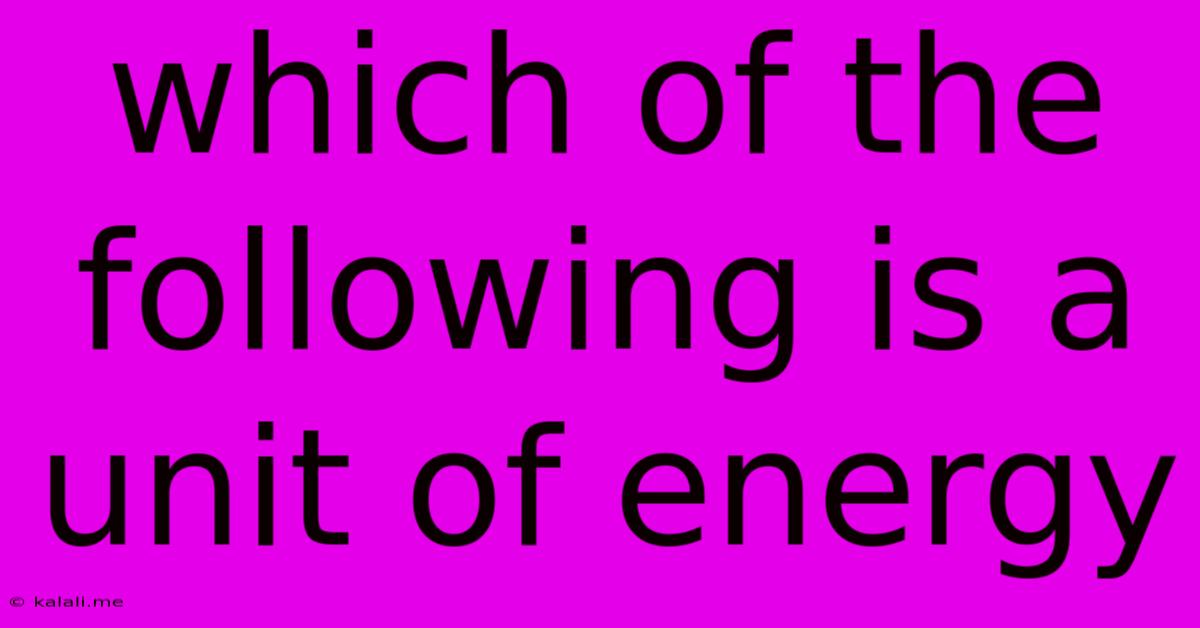Which Of The Following Is A Unit Of Energy
Kalali
Jun 14, 2025 · 3 min read

Table of Contents
Which of the following is a unit of energy? Understanding Energy Measurement
This article will explore the various units used to measure energy, clarifying which options represent a legitimate unit of energy and explaining the context in which each is used. Understanding energy units is crucial in various fields, from physics and engineering to everyday life. This guide will help you grasp the core concepts and differentiate between different energy measurement systems.
What is Energy?
Before diving into the units, let's briefly define energy. In simple terms, energy is the capacity to do work. It exists in various forms, including kinetic energy (energy of motion), potential energy (stored energy), thermal energy (heat), chemical energy, and nuclear energy. The amount of energy present is quantified using specific units.
Units of Energy: A Comprehensive Overview
Several units are used to measure energy, each with its own specific applications and contexts. Here are some of the most common:
-
Joule (J): This is the standard international unit (SI unit) of energy. One Joule is defined as the work done when a force of one newton is applied over a distance of one meter. It's a fundamental unit used across numerous scientific and engineering disciplines. The Joule is versatile and applicable to various forms of energy.
-
Kilowatt-hour (kWh): This unit is commonly used for measuring electrical energy consumption. One kilowatt-hour is the energy consumed when using one kilowatt of power for one hour. It's widely used on electricity bills and to quantify the energy capacity of batteries. This unit is frequently encountered in everyday life.
-
Calorie (cal): This is a unit of energy often associated with heat and food. One calorie is the amount of energy required to raise the temperature of one gram of water by one degree Celsius. While often used informally, the more precise scientific unit is the kilocalorie (kcal), which is often called a "Calorie" (with a capital C) in nutritional contexts.
-
Electronvolt (eV): This unit is used in atomic and nuclear physics. It represents the energy gained by a single electron when it accelerates through a potential difference of one volt. It's particularly useful for describing the energies of subatomic particles.
-
British Thermal Unit (BTU): This unit is used primarily in the United States and represents the amount of heat required to raise the temperature of one pound of water by one degree Fahrenheit. It's commonly used in HVAC (heating, ventilation, and air conditioning) systems and energy calculations.
Which is NOT a unit of energy?
While the units listed above are all legitimate units of energy, other quantities might be confused with energy units. For instance, power is a measure of the rate at which energy is transferred or converted, not a measure of energy itself. Power is typically measured in Watts (W), which are Joules per second. Confusing power with energy is a common misconception. Similarly, force (measured in Newtons) and pressure (measured in Pascals) are not units of energy.
Conclusion:
The Joule (J) is the fundamental SI unit of energy, but other units like kilowatt-hours (kWh), calories (cal), electronvolts (eV), and BTUs are used depending on the specific application and context. Understanding these different units and their uses is essential for clear communication and accurate calculations in various scientific and practical scenarios. Remembering the distinction between energy and related quantities like power is crucial for avoiding common misunderstandings.
Latest Posts
Latest Posts
-
Least Common Multiple Of 60 And 72
Jun 15, 2025
-
What Is The Unit Of The Coefficient Of Friction
Jun 15, 2025
-
Is Milk Of Magnesia Acidic Or Basic
Jun 15, 2025
-
Which Of The Following Is Not A Consumer
Jun 15, 2025
-
Which Of The Following Is Not An Optical Storage Device
Jun 15, 2025
Related Post
Thank you for visiting our website which covers about Which Of The Following Is A Unit Of Energy . We hope the information provided has been useful to you. Feel free to contact us if you have any questions or need further assistance. See you next time and don't miss to bookmark.